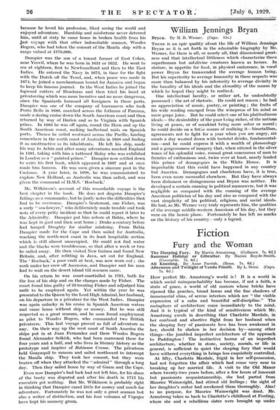William Jennings Bryan
Bryan. By M. R. Werner. (Caps. 15s.) THERE is an epic quality about the life of William Jennings Bryan as it is set forth in the admirable biography by Mr. Werner, for there is all, or nearly all, that dimensional great- ness and that intellectual littleness which characterize those superhuman but subdivine creatures known as heroes. In, stature, in appetite for food, in physical endurance, in vocal power Bryan far transcended the average human being. But his superiority to average humanity in these respects was more than balanced by his inferiority to average divinity in the banality of his ideals and the absurdity of the means by which he hoped they might be realized.
One intellectual faculty, or rather art, he undoubtedly possessed : the art of rhetoric. He could not reason ; he had no appreciation of music, poetry, or painting ; the fruits of his wide reading emerged from the winepress of his mind as mere grape juice. But he could select one a his platitudinous ideals— the desirability of the poor teing richer, of the nations living at peace, or of mankind being more sober or moral ; he could decide on a fut*Ne means of realizing it—bimetallism, agreements not to fight for a year when you are angry, six meals a day wE.shed down with teetotal drinks, fundamental- ism—and he could express it with a wealth of phraseology and a gorgeousness of imagery that, when uttered in the silver tones of his splendid voice, roused great concourses of men to frenzies of enthusiasm and, twice over at least, nearly landed this prince of demagogues in the White House. It is improbable that this could have happened in any country but America. Demagogues and charlatans have, it is true, been even more successful elsewhere. But they have always been dishonest or disingenuous and Bryan was neither. He developed a certain cunning in political manoeuvre, but it was negligible as compared with the cunning of the average American politician of his day and also as compared with the vast simplicity of his political, religious, and social ideals. He had, as Mr. Werner very truly represents him, the qualities of the average middle-western American of his day, but they were on the heroic Plane. Fortunately he has left no marks on the history of his country—only a legend.










































 Previous page
Previous page